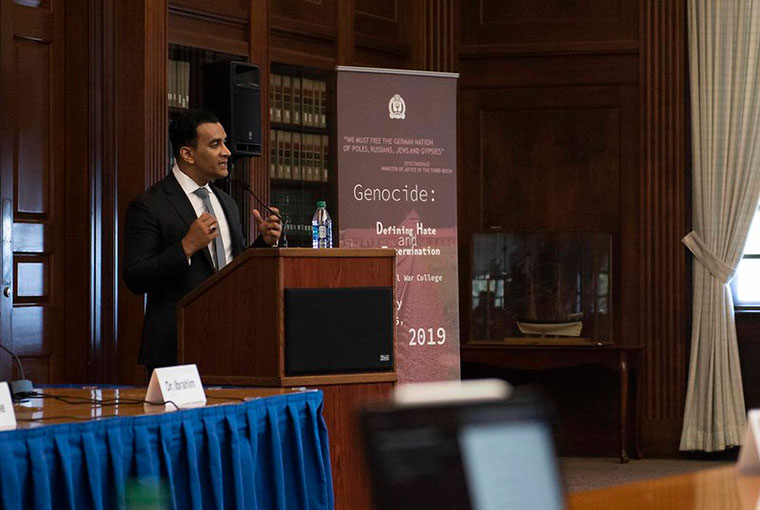U.S. Naval War College Holds Conference Exploring the Definitions of Genocide

The U.S. Naval War College gathered scholars on Oct. 15 to examine the issue of genocide, the college’s second conference on the subject as part of a course taught by associate professor Hayat Alvi.
This year’s program, called “Genocide: Defining Hate and Extermination,” focused on definitions of genocide, both legal and ideological.
Alvi, a political science scholar who specializes in international relations, said that a combination of current events and student feedback made her decide to focus on defining genocide.
“People are using language and words that are alarming to describe other people in society,” Alvi said in an interview, referring to examples such as the marginalization of the world’s refugees and a heightened visibility for racial supremacists.
“We take that in the field as early warning signs of hatred and intolerance.”
Rear Adm. Shoshana S. Chatfield, Naval War College president, welcomed the visiting scholars and acknowledged that the subject is a difficult one for students and academics alike.
“How should genocide be defined? Why does this word trigger so many political sensitivities? And, in the review of historic events, how might we look at some key words for evidence that something like this is going to happen again?” Chatfield asked.
“Those are just a few things to keep in mind as the discussion moves forward,” she said. “In this topic like so many others, the use of language matters, words matter, phrases matter.”
Guest scholars delved into how and why genocides have developed in the past and how the world has responded.
“If you were to simply ask anybody you stopped on the street, what is genocide, more likely than not, they would tell you that genocide is mass murder. And that could be true in many circumstances,” said keynote speaker Azeem Ibrahim, research professor at the U.S. Army War College and author of “The Rohingyas: Inside Myanmar’s Genocide.”
“But it’s not technically the case. Genocide never starts with mass murder. It always starts by ensuring that another group is seen to be different and to have less rights than the bulk of the population,” Ibrahim said.
Ben Kiernan -- who helped found Yale University’s Genocide Studies Program in 1998 based on his research on Cambodia’s Khmer Rouge regime – told the audience that justice comes quite late in genocide cases.
The Khmer Rouge genocide ended in 1979, and it wasn’t until 40 years later that a few senior leaders were convicted, Kiernan said.
“Slow justice is better than no justice. Although it’s also true that justice delayed is justice denied,” he said.
It took a number of years before a genocide case was developed and pursued through the United Nations, but by now most of the “big fish” of the Khmer Rouge have been prosecuted and at least served time in jail, Kiernan said.
“The institutions that were established in 1948 with the (United Nations) genocide convention have led to the wheels of justice moving around the world,” he told the audience, offering a hopeful note.
David Simon, director of Yale’s Genocide Studies Program, told the group that the way society thinks about genocide influences the way society responds.
“Genocide started out as an idea and becomes defined as a crime,” Simon said. “Then, in a second phase, that notion of genocide as a crime evolves into one of genocide as a process.”
If one thinks of genocide as a process, prevention becomes more possible, Simon concluded.
“If you think there’s a process, you can think of where you can intercede in a process – rather than merely respond afterward,” he said.
Don Thieme, a retired Marine Corps officer and veteran of many foreign policy assignments, talked about the role of force as a response to genocide. He said that clear definitions matter there, as well.
“The words that make sense in a diplomatic press conference or on a PowerPoint briefing slide may be of very little use to a 28-year-old company commander who has to employ force to achieve those objectives,” said Thieme, who serves on the college’s War Gaming Department staff.
“Absent precision in words, it’s impossible to expect precision in operations.”
Looking ahead, Alvi said she is pursuing a publisher for a compiled volume based on the presentations at this year’s conference.
